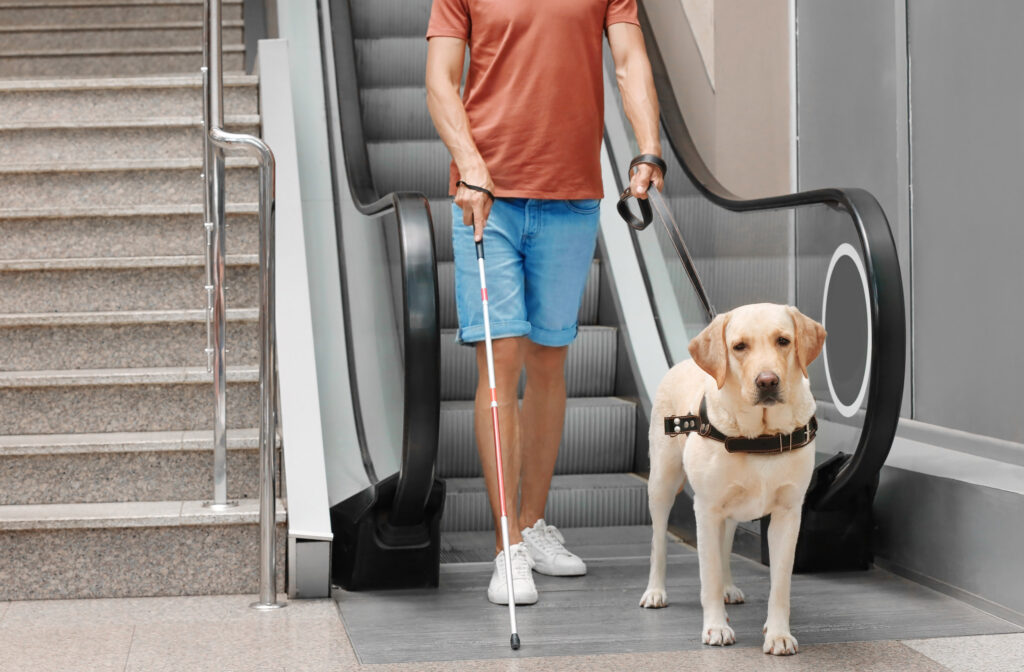What are the chances you have spotted a service dog out and about? With an estimated 500,000 registered service dogs currently working in the United States, it’s pretty likely! These highly trained animals provide essential support to individuals with disabilities. Let’s take a moment to understand what service dogs do and why they are so important for those who rely on them.
What is a Service Dog?
A service dog is defined as any dog that is individually trained to perform specific tasks for an individual with a disability. These disabilities may be physical, sensory, psychiatric, intellectual, or related to mental health. Service dogs are trained to complete tasks that assist their handlers, such as pulling a wheelchair, retrieving dropped items, alerting someone to sounds, reminding them to take medication, or pressing an elevator button.
Service Animals vs. Emotional Support Animals
It is important to distinguish between service animals and emotional support animals (ESAs). Unlike service dogs, ESAs are not trained to perform specific tasks. Instead, they provide comfort and companionship, which is beneficial but does not meet the legal definition of a service animal under the Americans with Disabilities Act (ADA). A doctor’s note prescribing an emotional support animal does not grant it the same legal protections or public access rights as a trained service dog.
Examples of Service Dog Skills
Service dogs are trained to assist individuals with a wide range of disabilities. Here are some common types of service dogs and the tasks they perform:
-
Guide Dogs
help individuals with visual impairments navigate safely. They are trained to recognize obstacles, stop at curbs, and guide their handlers around hazards.
-
Hearing Dogs
alert individuals who are deaf or hard of hearing to important sounds, such as doorbells, alarms, or a person calling their name.
-
Psychiatric Service Dogs
assist individuals with mental health conditions, such as PTSD. They may remind their handler to take medication, interrupt episodes of distress, or create a buffer in crowded spaces.
-
Sensory Assistance Dogs
help individuals with autism by providing deep pressure therapy, preventing self-harm, or guiding their handler to safety.
-
Seizure Response Dogs
provide aid to individuals with epilepsy by detecting the onset of a seizure, staying with the person during an episode, or fetching help if needed.
-
Diabetic Alert Dogs
detect changes in blood sugar levels and alert their handlers before dangerous highs or lows occur, allowing them to take necessary precautions.
-
Allergen Detection Dogs
help individuals with severe allergies by identifying allergens in food or the environment before their handler is exposed. Their super-scent abilities can detect things like peanuts and gluten!
In addition to their practical skills, service dogs offer companionship and emotional stability, improving their handlers’ overall well-being.
The Impact of Service Dogs on Mental Health
Service dogs provide significant benefits beyond physical assistance. Research led by Dr. Maggie O’Haire at Purdue University examined the impact of service dogs on veterans with PTSD. Her studies found that veterans with service dogs experienced lower overall symptoms of PTSD compared to those on a waitlist for a dog. Service dogs help their handlers manage stress, reduce anxiety, and regain independence. While they are not a cure, they offer vital support that can improve the quality of life for individuals facing mental health challenges.
Barriers to Accessing a Service Dog
Despite their proven benefits, obtaining a service dog can be a long and costly process. Many individuals with disabilities face significant barriers when trying to access these life-changing animals. The waitlist for a trained service dog can be more than five years, and the cost of training a single service dog can exceed $20,000. These challenges make it difficult for many people who would benefit from a service dog to acquire one.
Finding the Right Service Dog Organization
If you or a loved one are considering a service dog to assist with a medical condition or disability, it’s important to find a reputable organization that can provide the right support. Pillar Patient Advocates can help you navigate the process and connect with trustworthy service dog programs. Our board-certified patient advocates are here to guide you toward the best resources for your health needs.
For more information, reach out to Pillar Patient Advocates today!



